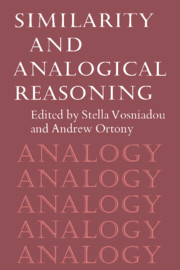Book contents
- Frontmatter
- Contents
- Preface
- List of contributors
- Similarity and analogical reasoning: a synthesis
- Part I Similarity and the structure of concepts
- 1 Similarity, typicality, and categorization
- 2 Similarity and decision making
- 3 Intraconcept similarity and its implications for interconcept similarity
- 4 Two-tiered concept meaning, inferential matching, and conceptual cohesiveness
- 5 From global similarities to kinds of similarities: the construction of dimensions in development
- 6 Comments on Part I: Psychological essentialism
- Part II Analogical reasoning
- Part III Similarity and analogy in development, learning, and instruction
- Afterword: Comments on Parts I, II, and III: A framework for a theory of comparison and mapping
- Name index
- Subject index
4 - Two-tiered concept meaning, inferential matching, and conceptual cohesiveness
Published online by Cambridge University Press: 22 October 2009
- Frontmatter
- Contents
- Preface
- List of contributors
- Similarity and analogical reasoning: a synthesis
- Part I Similarity and the structure of concepts
- 1 Similarity, typicality, and categorization
- 2 Similarity and decision making
- 3 Intraconcept similarity and its implications for interconcept similarity
- 4 Two-tiered concept meaning, inferential matching, and conceptual cohesiveness
- 5 From global similarities to kinds of similarities: the construction of dimensions in development
- 6 Comments on Part I: Psychological essentialism
- Part II Analogical reasoning
- Part III Similarity and analogy in development, learning, and instruction
- Afterword: Comments on Parts I, II, and III: A framework for a theory of comparison and mapping
- Name index
- Subject index
Summary
Introduction
Suppose we asked someone how to get to some place in the city we were visiting and received needed instructions in response. Clearly, we would say that this person knew the answer, no matter whether the person knew the place personally or just had to figure out its location on the basis of general knowledge of the city, that is, by conducting inference. We would say this, of course, only if the answer were given to us in a reasonable amount of time.
The above example illustrates a general principle: One knows what one remembers, or what one can infer from what one remembers within a certain time constraint. Thus our knowledge can be viewed as a combination of two components, memorized knowledge and inferential extension, that is, knowledge that can be created from recorded knowledge by conducting inference within a certain time limit.
The main thesis of this chapter is that individual concepts – elementary components of our knowledge – parallel such a two-tiered nature of knowledge. We hypothesize that processes of assigning meaning to individual concepts recognized in a stream of information, or of retrieving them from memory to express an intended meaning are intrinsically inferential and involve, on a smaller scale, the same types of inference – deductive, analogical, and inductive – as processes of applying and constructing knowledge in general. This hypothesis reflects an intuition that the meaning of most concepts cannot, in principle, be defined in a crisp and context-independent fashion.
- Type
- Chapter
- Information
- Similarity and Analogical Reasoning , pp. 122 - 145Publisher: Cambridge University PressPrint publication year: 1989
- 6
- Cited by



